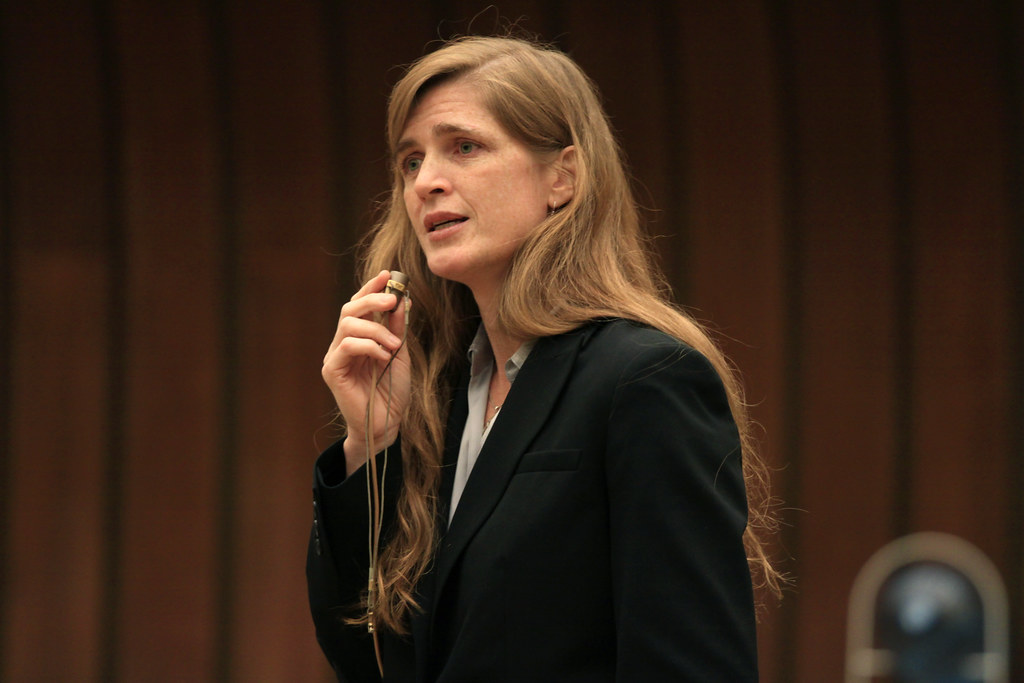
By Ella Goldblum
Samantha Power, Yale graduate and former United States Ambassador to the United Nations, is one of those rare figures who can pack an auditorium on a Wednesday afternoon.
On October 2, approximately two hundred people gathered in the Levinson Auditorium at Yale Law School to listen to Beverly Gage, director of the Brady-Johnson Program in Grand Strategy at Yale, moderate a discussion between Power and two of her former colleagues. Power’s talk was the first in the Brady-Johnson Big Picture speaker series, which Gage characterized as an opportunity to “step back a little bit from the relentless news cycle.”
Power sat onstage with Jake Sullivan, Yale Law School lecturer and former national security adviser in the Obama administration, and Harold Koh, Sterling Professor of International Law and former Legal Adviser of the Department of State in the Obama administration. While the discussion largely centered around Power’s 2019 book, The Education of an Idealist: A Memoir, the three also recalled their experiences serving in the Obama White House.
Power described her latest work as distinct from her previous two because she wrote it in “a very personal way.” If the book—which describes her childhood in Ireland and Georgia, her college experience at Yale, and her shift from activist to government insider—was not enough, her talk further demonstrated just how skilled Power is as a storyteller. She began with a nerve-wracking anecdote about going on a blind date and accidentally sending an unfavorable summary of it to a Listserv with important government officials. By the time she reached the story’s punchline, the audience had erupted in laughter.
Throughout the discussion, Power struck a delicate balance between expertise and humility. She recounted that while working in the Obama administration, she desperately wanted to go to the Oval Office despite not receiving an invite. She felt hurt, thinking she was not indispensable in the administration in the way she had expected to be. Upon finally receiving the coveted invitation, Power realized she had no idea where the Office was. Too embarrassed to ask anyone, she googled a map in secret, only to discover later that other invited officials had done the same thing. To a high-achieving audience that likely suffers from some degree of impostor syndrome, the story felt like a sigh of relief.
While Power’s colorful stories immediately humanized her, she did not shy away from discussing her stellar career in politics and her ideology on global affairs. She tackled a question on ‘American exceptionalism,’ saying she avoids the term out of respect for Latin American colleagues who find it offensive. More concretely, Power added that when she was the US Ambassador to the United Nations, she made it her mission to meet all 194 other UN Ambassadors, fifty of whom had never been visited by any previous US Ambassadors. “The expectation was that we’re America, the most powerful country in the world, and other countries would come to us,” she said.
Power further spoke of America’s importance on the world stage, saying that “US leadership is a fundamental necessity” for the nation to thrive. She noted that the interest in US leadership has shrunk in today’s more isolationist era of politics, but suggested that the role of the United States is akin to that of a team captain who supports countries with fewer resources.
Contrary to what one might believe based on the title of her book, Power said her goal in writing it was not to suggest that “the forces of gravity and the status quo are too potent for any one person to make a dent in.” She challenged the idea that one necessarily has to become jaded (or, as in the old saying, Republican) as they grow up. Instead, she has dedicated her life to channeling her activist spirit for pragmatic diplomacy and learning how to “prosecute [her] ideals in a messy world.” She attributed some of her concern for social justice issues to her undergraduate experience at Yale, in which she reported learning about the movement against apartheid, divestment campaigns, and US-backed atrocities in Latin America. Later in life, Power witnessed extreme trauma as a war correspondent is Bosnia, which gave her perspective on her privilege. She reiterated this theme in discussing her choice to write her latest book, saying she “was hoping to bring a world that we had the privilege of serving in to more people.”
After the talk, which lasted almost two hours, most audience members lined up to request signed copies of their memoirs.
Ella is a first year in Saybrook College. You can contact her at ella.goldblum@yale.edu.